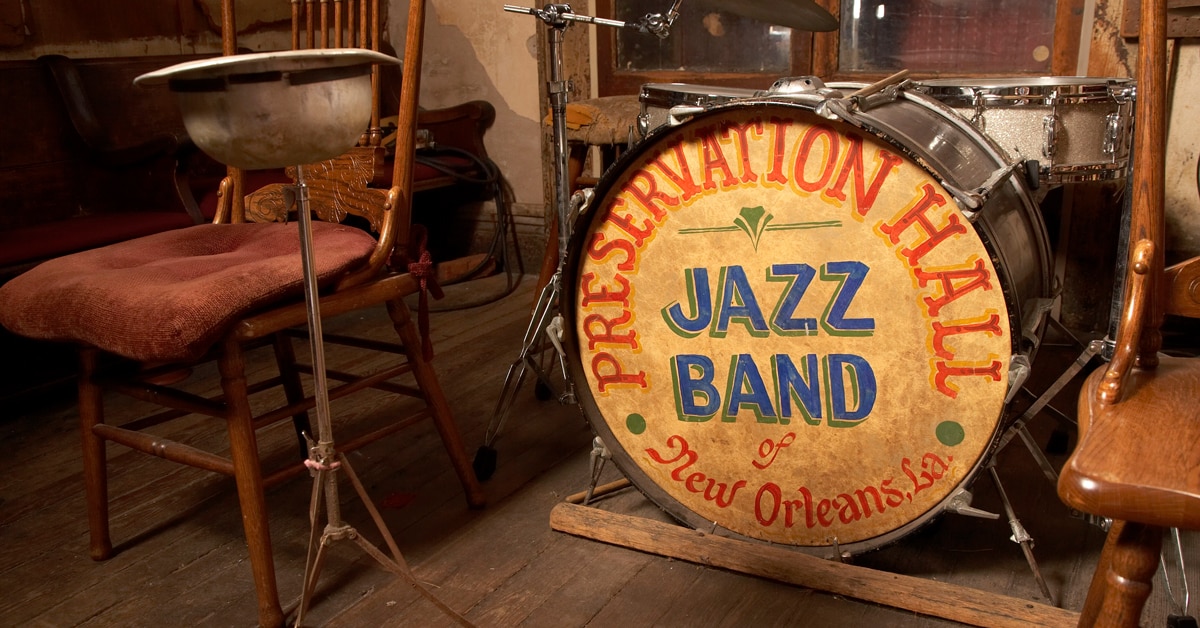Be Heard: Guitar Center is celebrating artists, brands and organizations that are using music to raise awareness on critical issues facing us all, to help us heal, to bring us together—to make the world a better place.
If you ask around about where to see live jazz in the New Orleans French Quarter, everyone will tell you Preservation Hall is the place. Just look for the long line of people snaking down the sidewalk along St. Peter Street—you can’t miss it.
“I've had people show up at 2 to get in line, and to start saving their place,” said Bradley Williams, a former doorman at the venue, which hosts five packed shows per night, 360 nights a year. “Even for people who are in line for the next show, and the next show, and the next show, I've had people who think they're going to make the 10 p.m. and I have to go in the back of the line and tell them it’s just not going to happen.”
Ironically, Preservation Hall was founded to address the opposite problem.
In the late 1950s, rock 'n' roll was ascendant. Even in New Orleans, the birthplace of jazz, the number of paying venues for jazz players began to dwindle as audiences lost interest in the genre. That’s why local fan Larry Borenstein began to invite musicians to play at his small art gallery, tucked away in the heart of the French Quarter.
“A lot of places you could play back then were maybe something like on Bourbon Street, like burlesque shows, where music was more of a supporting aspect,” said Ron Rona, the current artistic director at Preservation Hall.
So the story goes, Borenstein’s art gallery became so well known for its intimate jazz performances that he soon abandoned selling art altogether. He moved the shows into a larger space next door (but not much larger), with unfinished walls and a creaky wood floor. It was in this space that Preservation Hall was born.

The venue has changed little since those early days. They still use no amplification, serve no food or drinks, and the seating is nothing more than a set of wooden benches. It’s a far cry from the loud, booze-drenched bars peppered throughout the French Quarter, including a few on the same block as the Hall.
“What we do here is completely on the other side of that spectrum, where the focus is the music,” Rona explained.
But the deeper you get into the world of Preservation Hall, the more you realize that while the shows focus on the music, the organization itself is all about the musicians. The nightly shows feature a rotating cast of performers ranging from 28 to 92 years old, and the Hall’s mission is to foster not only their relationship with the audience, but also the mentorship between the older musicians and younger ones.
“This was created to be a platform for them to play, to hopefully earn a living, and most importantly, for them to share those gifts, to share that gift of music that they’ve been given,” said Rona. “Even before the Hall, those traditions were passed onto them somehow, and you figure every single artist here has a different path to that.”
In addition to the venue roster, Preservation Hall maintains a smaller band of top players under the name Preservation Hall Jazz Band, which has toured the world and collaborated with popular artists including Foo Fighters, Dave Matthews and Mos Def. The Hall also runs the Preservation Hall Foundation, a charitable organization founded in 2011. Talk to anyone from any of these branches, and they’ll tell you it’s all one project, with one goal: to protect, preserve and perpetuate New Orleans jazz.
“We’re really just formalizing a lot of the things that were happening at the Hall in one way or another before the foundation existed,” said Williams, the former doorman who is now Programs Associate for the charitable foundation. “There’s always been people looking out for the older musicians. We’ve always been connected to the community. We’ve always been reaching out to young people and trying to get them involved.”
Just like the band, the foundation spans generations. They run a variety of programs to bring jazz to young people, and they also fund a legacy program to care for elderly musicians. Among the boldest programs is Unlocking Potential, a project that sends Preservation Hall musicians to teach classes at juvenile detention centers.
“We’re there during the school day teaching trumpet, trombone, we do drums, saxophone, and then I teach the digital audio class,” said Williams.
The vast majority of the musicians at the Hall are New Orleans natives, and the issues of poverty and youth incarceration in the city are not abstract to them.
“Some of the musicians who are helping us have been system-involved themselves, so I know they feel a very personal connection to that,” said Williams. “A lot of people are locked up, maybe too many, and also it’s hard when it’s children, you know? And oftentimes, and especially I would say in New Orleans, they are forgotten, or treated as not kids anymore, or lesser than … without a lot of formal mental health care outside the facilities or inside, we feel like this is a good place for kids not only to learn a lot and maybe take something with them and have a skill, but also just a place to cool off a little bit, let off some steam, because they're in really tough situations.”
You can learn more about the Preservation Hall Foundation, including how to donate money or musical instruments, at preshallfoundation.org.







